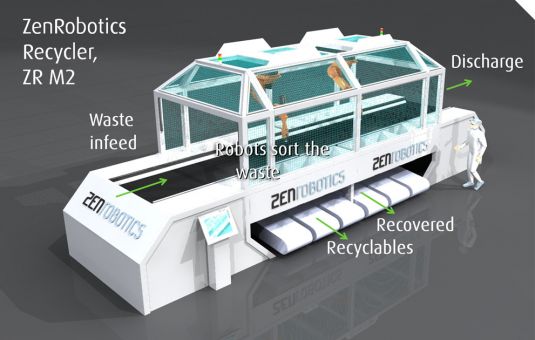 For such an essential part of the green economy, recycling remains a dirty, messy business. Enter ZenRobotics, which adds artificial intelligence to industrial robots to enable them to recycle construction waste. The company recently won Finland’s CleanTech Open competition and will represent the country at this week’s Cleantech Open Global Ideas Final.
For such an essential part of the green economy, recycling remains a dirty, messy business. Enter ZenRobotics, which adds artificial intelligence to industrial robots to enable them to recycle construction waste. The company recently won Finland’s CleanTech Open competition and will represent the country at this week’s Cleantech Open Global Ideas Final.
Off-the-shelf industrial robots can only operate in very constrained environments where the objects being manipulated are uniform and the movements required can be pre-defined. This makes them unsuitable for recycling objects in multiple materials and of different shapes and sizes. Current automated systems can only handle one material at a time. As a result, much recycling is still done manually and in hazardous conditions.
The ZenRobotics recycler is designed for commercial and industrial waste, municipal solid waste and construction waste but the first prototype product is for demolition and other construction waste. The unit weighs about six tonnes and a four-robot unit is about 33 feet long. SITA Finland, a subsidiary of the largest environmental services provider in Europe, plans to trial the recycler.
 Typical construction materials which can be recycled are concrete, wood, metals and plastics. Recycled metal and plastics, for example, are worth upwards of $200 per tonne. Concrete production is a Co2-intensive process. According to a report from LUX research, cement production consumes roughly 3 percent of the world’s primary energy, including nearly 10 percent of the primary energy used for global industry. In total, cement production accounts for roughly 6 percent of global carbon emissions.
Typical construction materials which can be recycled are concrete, wood, metals and plastics. Recycled metal and plastics, for example, are worth upwards of $200 per tonne. Concrete production is a Co2-intensive process. According to a report from LUX research, cement production consumes roughly 3 percent of the world’s primary energy, including nearly 10 percent of the primary energy used for global industry. In total, cement production accounts for roughly 6 percent of global carbon emissions.
ZenRobotics develops biologically-inspired, machine learning software which can be used to operate standard industrial robots and train them to separate multiple raw materials from waste. A plethora of sensors like visible spectrum cameras, near infrared cameras, 3D laser scanners, X-rays, metal detectors and weight detectors can be used to recognise materials of different types. ZenRobotics also uses sensors like 3D scanners and touch sensors to improve the robot’s gripper.
Software which learns is rarely 100 percent accurate at performing the task it is trained to do. The false positive and false negative rates are therefore important measures of the effectiveness of a machine learning algorithm. In this case, those measures translate into the rate at which materials are mis-identified or not reycled when they should be. ZenRobotic’s CEO Jaakko Sarela declined to give exact figures but said that the “accuracy is very high. In the end of the day, the purity rate of the recycled material depends mostly on the customer needs.”
ZenRobotics is based in Helsinki, Finland, has 20 employees and has received 0.7 million EUR in private funding.
VentureBeat's mission is to be a digital town square for technical decision-makers to gain knowledge about transformative enterprise technology and transact. Learn More
